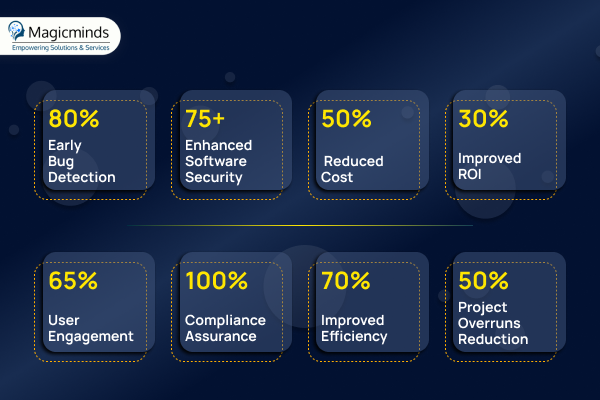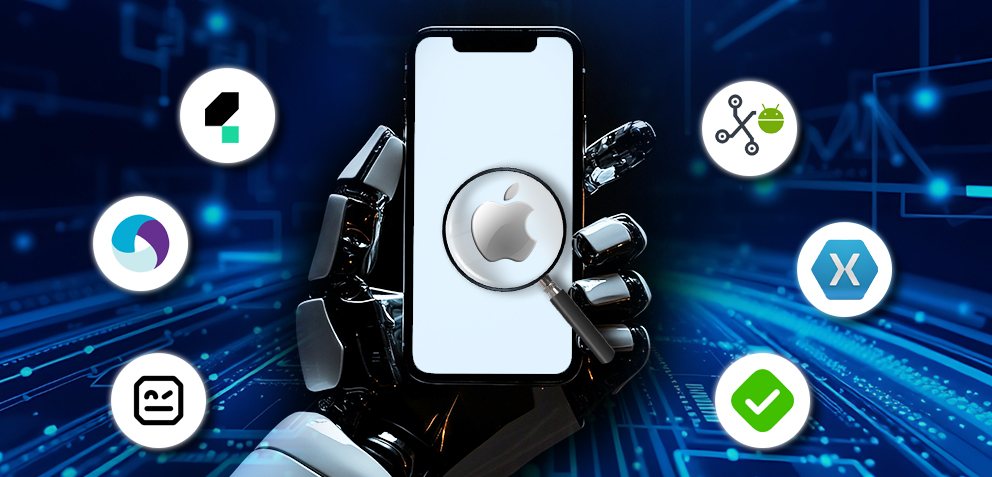Embrace AI for Superior Mobile App Security Testing Solutions

Table Of Contents
 Stay In-the-loop
Stay In-the-loop
Get fresh tech & marketing insights delivered right to your inbox.
Share this Article
Tags
Category
- .Net Developer
- Adtech
- Android App Development
- API
- App Store
- Artificial Intelligence
- Blockchain Development
- Chatbot Development
- CMS Development
- Cybersecurity
- Data Security
- Dedicated Developers
- Digital Marketing
- Ecommerce Development
- Edtech
- Fintech
- Flutter app development
- Full Stack Development
- Healthcare Tech
- Hybrid App Development
- iOS App Development
- IT Project Management
- JavaScript development
- Laravel Development
- Magento Development
- MEAN Stack Developer
- MERN Stack Developer
- Mobile App
- Mobile App Development
- Nodejs Development
- Progressive Web Application
- python development
- QA and testing
- Quality Engineering
- React Native
- SaaS
- SEO
- Shopify Development
- Software Development
- Software Outsourcing
- Staff Augmentation
- UI/UX Development
- Web analytics tools
- Wordpress Development
The advancement of AI-powered testing techniques has significantly enhanced mobile app security. AI-driven mobile app testing can proactively identify vulnerabilities, detect potential threats, and lower security risks more efficiently. This approach not only enhances mobile app resilience but also builds strong customer engagement in this digital world.
This article aims to illuminate how AI can disrupt the mobile security testing world, strengthening security more than ever. So, what’re you waiting for? Let’s begin our journey!
Happy reading!
Understanding The Mobile App Security Testing World
The software security of mobile applications across multiple platforms, including Android, iOS, and Windows Phone, is the main emphasis of mobile application security. This includes apps that work on tablets and mobile phones as well. It involves evaluating applications for security flaws within the frameworks they were developed with, the platforms they are intended to run on, and the expected user base (e.g., employees vs. end users). Mobile apps are an essential component of every company’s online presence, and many companies only utilize them to communicate with customers worldwide.
More people than ever before prefer mobile apps over traditional desktop ones for the majority of their digital tasks. Users actively used mobile applications on their mobile devices for 54% of their digital media time in the United States alone in 2015. A significant portion of the user data that these apps access is sensitive data that has to be shielded from unwanted access.
Security controls are built into all well-known mobile platforms to assist software developers in creating safe applications. Nonetheless, the developer is frequently left to select from a plethora of security solutions. Insufficient screening may result in the deployment of security features that adversaries easily exploit.
Advantages Of Mobile App Security Testing
Before we delve deep into how AI is revolutionizing mobile app security testing, let’s understand the benefits of mobile app security testing. Have a look:
- Many commercial and free mobile application security solutions are available that evaluate apps with differing degrees of efficacy using either static or dynamic testing approaches. However, no single instrument can offer a thorough evaluation of the application. To get the best coverage, however, a mix of manual review and both static and dynamic testing is needed.
- Using mobile application security testing as a pre-production inspection ensures that the security features function as intended while protecting against implementation mistakes. It can assist in identifying edge cases—security bugs—that the development team might not have seen coming. To make sure that problems are found before going live, the testing procedure considers both code and configuration concerns in a setting similar to production.
- To identify threats in mobile apps, we need to perform both static and dynamic testing while keeping the mobile environment in mind. AI tools help identify problems that may arise from frequent application updates.
- Security Testing searches for problems with the application’s back-end services and vulnerabilities in the application itself. We need to ensure that every facet of the application is tested by concentrating on the application and its back-end services.
Protect Your Data & Improve Mobile App Security – Optimize Your APIs With Our Robust Testing Solutions!
How AI Assists In Enhancing Mobile App Security Testing
Now that we’ve reached the main part of the blog hold your attention as we’ll illuminate to you how AI is transforming mobile app security testing. So, read on!
-
Advanced Security Testing Tools
AI boosts mobile security by following complicated algorithms that detect potential threats and risks. Advanced security testing tools help simulate various scenarios an attacker may use and provide much-needed insight to developers and security teams.
-
Biometric Verification Techniques
This testing involves assessing the reliability and security of biometric systems used for mobile device access. By integrating AI into biometric authentication, we can ensure robust protection against unauthorized access by making the authorization process more robust against cyber-attacks, adding an extra layer of protection.
-
AI-Driven Risk Assessment
AI enhances mobile security by continuously monitoring user behavior, app interactions, and network activities to identify any threats or suspicious behaviors in real time. It also improves decision-making by prioritizing the security protocols based on the severity and likelihood of risks, thereby strengthening overall mobile security potential cyber threats.
-
Interactions With Applications
Based on the AI algorithms, we can detect the deviations which may indicate potential threats, such as unusual app permission or odd data access patterns.
ALSO READ: The Ultimate Guide to Manual Testing with Proven Best Practices
-
Dynamic Test Cases
Leveraging AI, we can create and execute a wide range of test scenarios based on potential risks and real-time scenarios. This proactive approach helps find hidden threats and risks in an application even before it is deployed.
-
Improved Penetration Testing
AI enhances penetration testing through its advanced automation and intelligence. AI-powered testing tools help us simulate possible cyber attacks and identify threats in mobile applications and networks more efficiently than traditional methods.
-
Faster Incident Response
By enabling faster incident response through automated detection, analysis, and mitigation of security incidents, AI can enhance mobile security. AI-powered systems can streamline incident response by automating response actions like removing or flagging compromised devices and blocking suspicious activities, triggering alerts for potential threats in real-time, etc. This overall action ensures reduced response times, minimizes damage, and swift containment of security incidents by enhancing complete mobile security resilience.
-
Strong Encryption Techniques
AI maximizes mobile security through advanced encryption techniques by optimizing encryption algorithms , key management and threat detection which helps in reducing the risks of cyber attacks.
-
Adaptive Security Measures
Through adaptive security measures by continuously learning and adapting to new threats and user behaviors, AI enhances mobile security without compromising user experience.
-
Enhanced Testing Efficiency
With the introduction of AI, we can enhance our testing efficiency through automated testing processes and intelligent analysis. Through AI, we can generate and execute diverse test scenarios, identify threats faster than manual methods. AI powered tools target high risk areas, optimise test coverage and provide great insights to developers and security teams.
RELATED READ: API Testing 101: A Complete Approach to API Testing
Security Testing Process Of Mobile Application
Well, I hope we’ve cleared your doubts about how AI can improve your mobile app security testing process. Nevertheless, how about knowing the security testing process of mobile apps? Sounds fun, right? Let’s briefly discuss the security testing process.
-
Interacting With The Application
Mobile application security testing does a thorough examination of how data is transmitted, stored, and received within the application which involves testing the HTTPS protocols to ensure proper data transmission and testing for potential issues like data leakage during transit.
-
Application Encrypted Sections Release
It involves the robustness of encryption implementations used within the application. It also checks if the encryption algorithms are correctly applied to sensitive data such as user credentials, payment information or other personal details which are stored on the device or transmitted over the network.
-
Examining the Code
Security testers check the decompiled code for common security issues like hardcoded credentials, insecure data storage practices, or inadequate input validation that could lead to threats like remote code execution or SQL injection.
-
Static Analysis
It plays an important role as it systematically examines the decompiled code of an application without executing it. This involves specialized tools such as static code analyzers (e.g., FindBugs, PMD) or integrated development environment (IDE) plugins to detect security flaws and potential threats.
-
Ensuring the Effectiveness of Security Controls
Penetration testing helps to simulate real-world attacks to identify vulnerabilities in authentication mechanisms, such as weak password policies, lack of multi-factor authentication (MFA), or inadequate session management whereas dynamic analysis complements this by examining how these controls behave in runtime, ensuring they effectively prevent unauthorized access and protect user data from exploitation during application use.
READ MORE: Mastering Test Automation Tool Selection: What Matters the Most?
Common Challenges In Mobile Application Security Testing
- Storing and wrongful use of the private information in a way other apps on the user’s phone could access.
- Implementing weak authentication and authorization checks that malevolent applications or users could evade.
- Utilizing data encryption techniques that are known to be weak or easily cracked.
- Security controls are built into all well-known mobile platforms to assist software developers in creating safe applications. Nonetheless, the developer is frequently left to select from a plethora of security solutions. Insufficient screening may result in deploying security features that adversaries easily exploit.
Transform Your Testing Cycles & Experience Faster Releases With Magicminds’ Cutting-Edge Automation Testing Services!
Book a Free Consultation!Enhance Your AI-Powered Mobile App Security Testing With Magicminds!!
Testing mobile apps is being revolutionized by the use of AI, which increases the speed, accuracy, and efficiency of the process. AI technology will advance and become more seamlessly integrated into app development and testing procedures, bringing even more advantages. Businesses that use AI-driven testing techniques are in a strong position to take the lead in the cutthroat mobile app industry by providing high-caliber products that live up to customer expectations.
However, many organizations struggle with the complexities of mobile testing. If you’re also one of them and scratching the surface, we’ve got you covered! At Magicminds, we provide top-tier mobile app security testing services, making your app quality superior and running bug-free with lightning speed.

Partner with us to embrace the gateway toward unparalleled app quality. Don’t wait; grab the opportunity today! Contact Us!
The advancement of AI-powered testing techniques has significantly enhanced mobile app security. AI-driven mobile app testing can proactively identify vulnerabilities, detect potential threats, and lower security risks more efficiently. This approach not only enhances mobile app resilience but also builds strong customer engagement in this digital world.
This article aims to illuminate how AI can disrupt the mobile security testing world, strengthening security more than ever. So, what’re you waiting for? Let’s begin our journey!
Happy reading!
| Table of Contents
Understanding The Mobile App Security Testing World Advantages Of Mobile Security Testing
How AI Assists In Enhancing Mobile App Security Testing
Security Testing Process Of Mobile Application Common Challenges In Mobile Application Security Testing
Enhance Your AI-Powered Mobile App Security Testing With Magicminds!! |
Understanding The Mobile App Security Testing World
The software security of mobile applications across multiple platforms, including Android, iOS, and Windows Phone, is the main emphasis of mobile application security. This includes apps that work on tablets and mobile phones as well. It involves evaluating applications for security flaws within the frameworks they were developed with, the platforms they are intended to run on, and the expected user base (e.g., employees vs. end users). Mobile apps are an essential component of every company’s online presence, and many companies only utilize them to communicate with customers worldwide.
More people than ever before prefer mobile apps over traditional desktop ones for the majority of their digital tasks. Users actively used mobile applications on their mobile devices for 54% of their digital media time in the United States alone in 2015. A significant portion of the user data that these apps access is sensitive data that has to be shielded from unwanted access.
Security controls are built into all well-known mobile platforms to assist software developers in creating safe applications. Nonetheless, the developer is frequently left to select from a plethora of security solutions. Insufficient screening may result in the deployment of security features that adversaries easily exploit.
Advantages Of Mobile App Security Testing
Before we delve deep into how AI is revolutionizing mobile app security testing, let’s understand the benefits of mobile app security testing. Have a look:
- Many commercial and free mobile application security solutions are available that evaluate apps with differing degrees of efficacy using either static or dynamic testing approaches. However, no single instrument can offer a thorough evaluation of the application. To get the best coverage, however, a mix of manual review and both static and dynamic testing is needed.
- Using mobile application security testing as a pre-production inspection ensures that the security features function as intended while protecting against implementation mistakes. It can assist in identifying edge cases—security bugs—that the development team might not have seen coming. To make sure that problems are found before going live, the testing procedure considers both code and configuration concerns in a setting similar to production.
- To identify threats in mobile apps, we need to perform both static and dynamic testing while keeping the mobile environment in mind. AI tools help identify problems that may arise from frequent application updates.
- Security Testing searches for problems with the application’s back-end services and vulnerabilities in the application itself. We need to ensure that every facet of the application is tested by concentrating on the application and its back-end services.
| Protect Your Data & Improve Mobile App Security – Optimize Your APIs With Our Robust Testing Solutions! Share Your Project Requirements! |
How AI Assists In Enhancing Mobile App Security Testing
Now that we’ve reached the main part of the blog hold your attention as we’ll illuminate to you how AI is transforming mobile app security testing. So, read on!
-
Advanced Security Testing Tools
AI boosts mobile security by following complicated algorithms that detect potential threats and risks. Advanced security testing tools help simulate various scenarios an attacker may use and provide much-needed insight to developers and security teams.
-
Biometric Verification Techniques
This testing involves assessing the reliability and security of biometric systems used for mobile device access. By integrating AI into biometric authentication, we can ensure robust protection against unauthorized access by making the authorization process more robust against cyber-attacks, adding an extra layer of protection.
-
AI-Driven Risk Assessment
AI enhances mobile security by continuously monitoring user behavior, app interactions, and network activities to identify any threats or suspicious behaviors in real time. It also improves decision-making by prioritizing the security protocols based on the severity and likelihood of risks, thereby strengthening overall mobile security potential cyber threats.
-
Interactions With Applications
Based on the AI algorithms, we can detect the deviations which may indicate potential threats, such as unusual app permission or odd data access patterns.
ALSO READ: The Ultimate Guide to Manual Testing with Proven Best Practices
-
Dynamic Test Cases
Leveraging AI, we can create and execute a wide range of test scenarios based on potential risks and real-time scenarios. This proactive approach helps find hidden threats and risks in an application even before it is deployed.
-
Improved Penetration Testing
AI enhances penetration testing through its advanced automation and intelligence. AI-powered testing tools help us simulate possible cyber attacks and identify threats in mobile applications and networks more efficiently than traditional methods.
-
Faster Incident Response
By enabling faster incident response through automated detection, analysis, and mitigation of security incidents, AI can enhance mobile security. AI-powered systems can streamline incident response by automating response actions like removing or flagging compromised devices and blocking suspicious activities, triggering alerts for potential threats in real-time, etc. This overall action ensures reduced response times, minimizes damage, and swift containment of security incidents by enhancing complete mobile security resilience.
-
Strong Encryption Techniques
AI maximizes mobile security through advanced encryption techniques by optimizing encryption algorithms , key management and threat detection which helps in reducing the risks of cyber attacks.
-
Adaptive Security Measures
Through adaptive security measures by continuously learning and adapting to new threats and user behaviors, AI enhances mobile security without compromising user experience.
-
Enhanced Testing Efficiency
With the introduction of AI, we can enhance our testing efficiency through automated testing processes and intelligent analysis. Through AI, we can generate and execute diverse test scenarios, identify threats faster than manual methods. AI powered tools target high risk areas, optimise test coverage and provide great insights to developers and security teams.
RELATED READ: API Testing 101: A Complete Approach to API Testing
Security Testing Process Of Mobile Application
Well, I hope we’ve cleared your doubts about how AI can improve your mobile app security testing process. Nevertheless, how about knowing the security testing process of mobile apps? Sounds fun, right? Let’s briefly discuss the security testing process.
-
Interacting With The Application
Mobile application security testing does a thorough examination of how data is transmitted, stored, and received within the application which involves testing the HTTPS protocols to ensure proper data transmission and testing for potential issues like data leakage during transit.
-
Application Encrypted Sections Release
It involves the robustness of encryption implementations used within the application. It also checks if the encryption algorithms are correctly applied to sensitive data such as user credentials, payment information or other personal details which are stored on the device or transmitted over the network.
-
Examining the Code
Security testers check the decompiled code for common security issues like hardcoded credentials, insecure data storage practices, or inadequate input validation that could lead to threats like remote code execution or SQL injection.
-
Static Analysis
It plays an important role as it systematically examines the decompiled code of an application without executing it. This involves specialized tools such as static code analyzers (e.g., FindBugs, PMD) or integrated development environment (IDE) plugins to detect security flaws and potential threats.
-
Ensuring the Effectiveness of Security Controls
Penetration testing helps to simulate real-world attacks to identify vulnerabilities in authentication mechanisms, such as weak password policies, lack of multi-factor authentication (MFA), or inadequate session management whereas dynamic analysis complements this by examining how these controls behave in runtime, ensuring they effectively prevent unauthorized access and protect user data from exploitation during application use.
READ MORE: Mastering Test Automation Tool Selection: What Matters the Most?
Common Challenges In Mobile Application Security Testing
- Storing and wrongful use of the private information in a way other apps on the user’s phone could access.
- Implementing weak authentication and authorization checks that malevolent applications or users could evade.
- Utilizing data encryption techniques that are known to be weak or easily cracked.
- Security controls are built into all well-known mobile platforms to assist software developers in creating safe applications. Nonetheless, the developer is frequently left to select from a plethora of security solutions. Insufficient screening may result in deploying security features that adversaries easily exploit.
| Transform Your Testing Cycles & Experience Faster Releases With Magicminds’ Cutting-Edge Automation Testing Services! Book a Free Consultation! |
Enhance Your AI-Powered Mobile App Security Testing With Magicminds!!
Testing mobile apps is being revolutionized by the use of AI, which increases the speed, accuracy, and efficiency of the process. AI technology will advance and become more seamlessly integrated into app development and testing procedures, bringing even more advantages. Businesses that use AI-driven testing techniques are in a strong position to take the lead in the cutthroat mobile app industry by providing high-caliber products that live up to customer expectations.
However, many organizations struggle with the complexities of mobile testing. If you’re also one of them and scratching the surface, we’ve got you covered! At Magicminds, we provide top-tier mobile app security testing services, making your app quality superior and running bug-free with lightning speed.
Partner with us to embrace the gateway toward unparalleled app quality. Don’t wait; grab the opportunity today! Contact Us!


